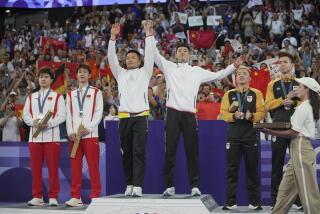On China’s National Day, Hong Kong Is Conflicted
- Share via
HONG KONG — Chinese flags fluttered along streets and bridges, streamed behind low-flying helicopters and even hung from girlie bars Wednesday to mark the first celebration here of China’s National Day.
But despite the red flags, carnivals and fireworks meant to arouse national pride, many Hong Kong people said that since the July 1 reversion to Chinese rule, they do not feel any more Chinese and are not proud to be part of China.
“Before the hand-over, I identified myself as a Hong Kong person,” said William Fung, a comptroller who came with his family to a National Day carnival in Victoria Park. “Since the hand-over, some of my friends call themselves Chinese, but I still call myself a Hong Kong person. I think it’s better to be from Hong Kong.”
While there has been a surge of activities designed to instill patriotism during the year of the hand-over, about 60% of people polled by the Hong Kong University Social Sciences Research Center on Tuesday said they do not feel proud of becoming Chinese nationals.
As Hong Kong nears 100 days under Chinese rule, one of the biggest challenges facing its new leaders is how to forge a unified identity for the former British colony. In nearly every speech, Chief Executive Tung Chee-hwa reminds listeners that while Hong Kong remains autonomous, it is no longer separate from China.
“We in Hong Kong take tremendous pride in our Chinese identity,” he said in his National Day address, which he delivered flanked by mainland representatives and army generals in the same harbor-side hall where the switch of sovereignty took place three months ago. “This is our home, and we will move forward together to promote the prosperity of our country.”
To remind Hong Kongers of their new Chinese role, some local movie theaters will soon show a film of China’s historic highlights, accompanied by the national anthem, before each feature presentation. Patriotic education has become part of the school curriculum, and next year most public schools will begin teaching in Chinese instead of English.
But a sense of separateness is hard to bridge. Hong Kong’s border with China is still heavily patrolled on both sides. Few of China’s 1.2 billion people can understand Cantonese, the Chinese dialect spoken in Hong Kong. In daily conversation, people still refer to Hong Kong as “us” and China as “them.”
Along with carnivals, concerts and a $3.8-million fireworks show, Wednesday’s festivities included an open day at the barracks of the Chinese People’s Liberation Army. The soldiers’ presence here has been one of the most controversial expressions of Chinese sovereignty because of the army’s 1989 bloody crackdown on demonstrators near Beijing’s Tiananmen Square. But nearly 4,000 people paid them a visit.
In the heart of the city, however, a small group of protesters urging Hong Kong to “Remember Tiananmen” marched to the new Convention and Exhibition Center, where Tung was hosting a party for 5,000 guests. And early today three youths were charged with criminal damage for destroying a Chinese national flag near a village on Lantau, an outlying island, a police spokeswoman said.
More to Read
Sign up for Essential California
The most important California stories and recommendations in your inbox every morning.
You may occasionally receive promotional content from the Los Angeles Times.













